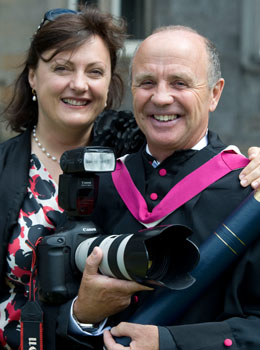Laureation address – Mr Doug Allan
Honorary Degree of Doctor of Science
Dr Clare Peddie
School of Biology
Thursday 24 June 2010
 Chancellor, it is my privilege to present Doug Allan for the degree of Doctor of Science, honoris causa.
Chancellor, it is my privilege to present Doug Allan for the degree of Doctor of Science, honoris causa.
Doug Allan has had an extraordinarily successful career as a still and video cameraman of Natural History. He is an award-winning photographer for the BBC’s Life in the Freezer from Antarctica, Polar Bear Special from the Arctic, The Blue Planet and Planet Earth. Few of us could fail to be awe-inspired by his footage of orcas attacking grey whales off California, polar bears capturing belugas in a frozen hole in the Canadian Arctic and leopard seals feeding on emperor penguins.
Doug Allan is a Scotsman, born one of twins, in Dunfermline in 1951. His father was a photojournalist who filmed sport for Scottish television. The first significant book he remembers reading was Jacques Cousteau’s The Silent World and in the early 1960s the first films produced by Cousteau were televised. He learned to dive with a local club and his passion for diving developed which, in turn, fuelled the desire to complete his degree in marine biology at Stirling University. After graduation, he accompanied a team of biologists on expeditions to the Red Sea, helped with the collection of data and began to take underwater stills.
In 1976, Doug began employment with the British Antarctic Survey. Here Doug must have begun to realise that he was no ordinary mortal, when he enjoyed five winters and twelve summers in the frozen South and began taking still photographs both above and below the ice. He was promoted to Station Commander and was awarded the Polar Medal by Queen Elizabeth and the Fuchs Medal by British Antarctic Survey for his achievements in the Antarctic. In 1981, a BBC film crew arrived at his Antarctic base to film for the Living Planet. Living in close proximity with the crew Doug learned about the business of freelance filming and photography and he had the opportunity to show some of his stills to the very encouraging Sir David Attenborough.
Buoyant from this encounter Doug began terrestrial filming and he covered Emperor Penguins while overwintering at Halley Research Station in the Weddell Sea. This footage subsequently appeared in the episode of Birds for All Seasons on the Antarctic. This represented the break Doug needed and he was recruited to take underwater film of Weddell Seals for Anglia Television’s Survival series. Doug’s experience in the Antarctic, his ability as a diver, his natural skill for photography and his tenacity, patience and dedication all contributed to his ongoing success and Doug was commissioned to take more film on a wide variety of subjects including narwhals, kittiwakes, humpbacks whales, snow leopards and polar bears. Technology was developing fast and the advent of digital videotape permitted longer filming periods and the equipment became more manageable underwater. He became principal photographer on the BBC’s Life in the Freezer series from Antarctica, Polar Bear Special from the Arctic and famously The Blue Planet and Planet Earth.
Not all of his work has been focused on the Polar Regions and Doug has also filmed from the length of the Andes, to the deserts of Africa and to the upper slopes of Mount Everest. He has been involved with over fifty films and series in his twenty-five year career, and has made more than sixty trips to the poles filming for Discovery, National Geographic, BBC and many others. He has worked with many different presenters including Sir David Attenborough, Ewan McGregor and Gordon Ramsay. By his own admission, however, Doug would rather be blasted on a skidoo in minus 35 degrees centigrade or diving under ice in clear blue water than being eaten alive by insects in a hot moist tropical jungle.
Filming in remote and hostile environments is not without the odd exciting moment and Doug has had close calls with walruses, polar bears and ice floes. It was while adrift in the Arctic on a 100ft ice floe awaiting rescue from a helicopter that Doug proposed to his wife Sue, herself a very talented wildlife film producer and photographer.
His excellent talent has been recognised internationally and he has won a number of awards including three Emmys, three BAFTAs, cinematography awards at Jackson Hole Wildlife Festival and Wildscreen Pandas. He has twice won the underwater category in the BBC Wildlife Photographer of the Year, was awarded the Cherry Kearton Medal by the Royal Geography Society and was granted Honorary Doctorates by the University of Stirling and Edinburgh Napier University in recognition of his contribution to wildlife and polar photography.
Fundamental to efforts to save the world’s endangered biodiversity from the brink of extinction is education through wildlife photography and filming. Doug Allan’s breath-taking footage has inspired many young students to learn, to understand and, in the future, to hopefully protect these remote and fragile ecosystems. Chancellor, in recognition of his major contribution to natural history through still and video photography, I invite you to confer on Doug Allan the Degree of Doctor of Science, honoris causa.
Category Awards